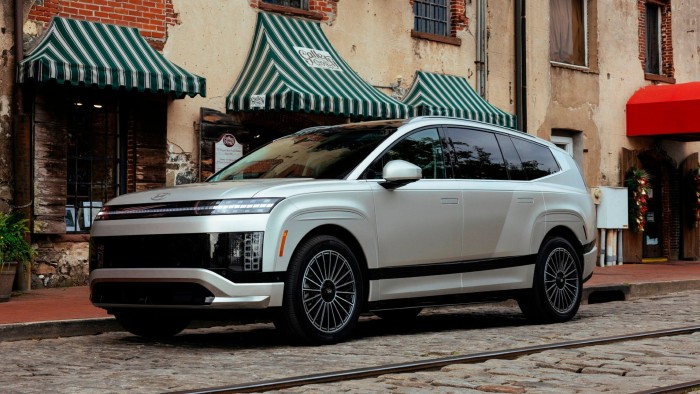Stay informed with free updates
Simply sign up to the Electric vehicles myFT Digest — delivered directly to your inbox.
Hyundai is seeking to ride on the growth of Chinese electric vehicles in Europe to grab market share from western and Japanese rivals as the South Korean group bets on consumers switching brands in the EV era.
In an interview with the Financial Times, Xavier Martinet, the new head of Hyundai’s European business, said the South Korean group was open to building a third plant on the continent as it aimed to replicate the expansion it achieved in the US.
“There’s no reason that we would be the first one being impacted by . . . the growth of the Chinese,” he said. “We might actually even somewhere benefit from it. A lot of people with EVs are more ready to switch brands than in the past.”
Hyundai and its sister brand Kia transformed their business in the US from a little-known foreign entrant to one of the market’s most dominant marques, especially in EV sales. In March, it completed construction of a $7.6bn EV plant in the US state of Georgia with an annual production capacity of up to 500,000 vehicles.
The group was second behind Tesla in US electric car sales in 2023 and 2024, although GM recently claimed second place in the first quarter of 2025.
Martinet, a former Renault executive, said Hyundai in the US was “one of the trailblazers or one of the leading brands on the market”. In Europe, “we need to work in this direction”, he said.
Hyundai and Kia currently have an 8.4 per cent EV share in the UK and wider Europe, compared with 7.9 per cent for Tesla, 28 per cent for Volkswagen group and 10 per cent for BMW, according to Schmidt Automotive Research.
The company has said it wanted to double its EV sales in Europe this year with a series of new product launches including its new small electric car Inster at less than €25,000 and its new three-row electric sport utility vehicle Ioniq 9.
While the South Korean group sees the push by Chinese brands into Europe as an opportunity, it also acknowledges the increasing threat from BYD, Chery and other Chinese brands. BYD alone has already grabbed a 3.1 per cent EV share in Europe.
“We have to really raise our game to the best level possible to fight these newcomers that are challenging us,” Martinet said. “The question is, are you more ready than the others to fight this threat? I think we are.”
New registrations of Hyundai and Kia vehicles also dropped 3.5 per cent from a year earlier during the January to May period, according to European car industry body ACEA.
The group’s progress in the US is part of a wider global push, targeting the Indian, Middle Eastern and south-east Asian markets as well as Europe after a collapse of its sales in China over the past decade.
But it finds itself under pressure in its home market, with models from BYD and Tesla both outselling Hyundai and Kia’s domestically produced EV offerings.
The group is hoping to capitalise on its size to boost investment in Europe and accelerate the speed of developing its vehicles with the in-house development of components.
It is looking to improve maintenance and the aftersales service for customers by analysing vehicle data, according to Martinet.
If the company can successfully expand its market share in Europe, Martinet said the group would consider expanding its manufacturing footprint in the Czech Republic and Turkey although it also has room to expand capacity at its two European plants.
“The idea is to continue going in this direction of designing vehicles for Europe, building them in Europe and selling them in Europe,” he said.


